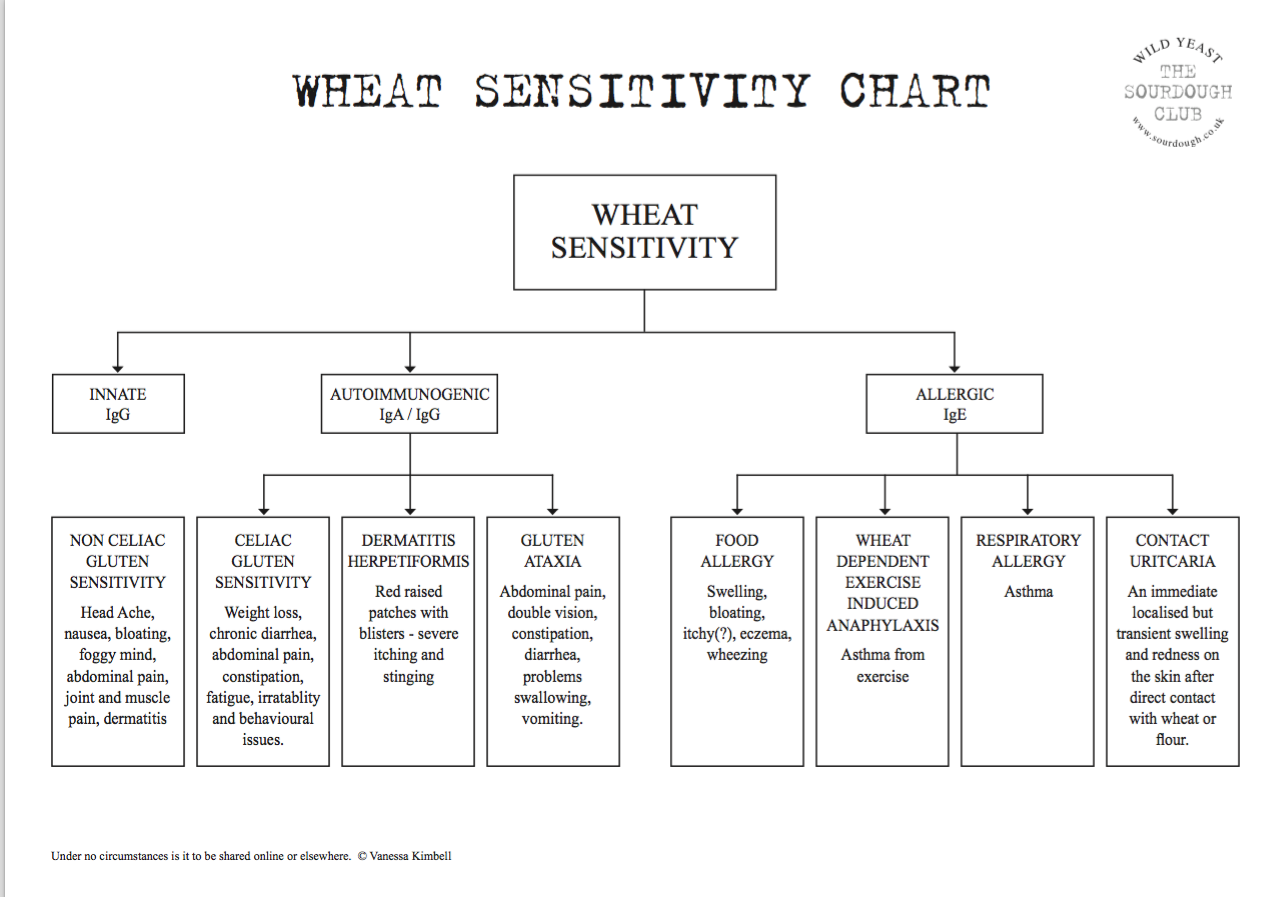I often hear from people who have difficulty digesting wheat or gluten. Gluten is frequently, and sometimes unjustly, accused of causing bloating and digestive discomfort. However, there are instances where wheat itself is the culprit. In this chart, I’ve delineated the various forms of wheat sensitivity, including innate IgG sensitivity, autoimmunogenic reactions (such as coeliac disease and gluten ataxia), allergic responses (including IgE-mediated allergies and wheat-dependent exercise-induced anaphylaxis), and non-coeliac gluten sensitivity, highlighting their symptoms and diagnostic criteria.
One of the most crucial aspects of personalising bread is obtaining the correct diagnosis in the first place. Although I may have suspicions based on someone’s symptoms, I never diagnose. I do, however, suggest where and how you can obtain a diagnosis. Then, of course, you can come back, and I can assist in personalising your bread. You can read more about diagnosing wheat or gluten intolerance here.

Wheat Sensitivity: An Overview
Wheat sensitivity encompasses a spectrum of disorders that describe adverse reactions to wheat and related proteins, presenting a complex challenge in dietary management and health care. It can manifest through various immune-mediated pathways, including allergic, autoimmune, and possibly innate immune responses.
Innate IgG Wheat Sensitivity
Innate IgG wheat sensitivity involves the immune system’s IgG antibodies reacting to wheat proteins. Unlike immediate allergic reactions, IgG-mediated responses can be delayed, leading to a range of symptoms such as gastrointestinal discomfort, headaches, and fatigue. This type of sensitivity does not involve the same rapid immune response as IgE-mediated allergies but indicates a chronic, low-level immune activation against wheat components.
Autoimmunogenic Wheat Sensitivity: IgA and IgG Reactions
Autoimmunogenic wheat sensitivity with IgA and IgG immune reactions refers to conditions where the body’s immune system mistakenly targets its own tissues in response to wheat intake. These autoimmune responses can lead to conditions like coeliac disease, where IgA and IgG antibodies against specific wheat proteins cause damage to the intestinal lining, leading to nutrient malabsorption and a range of systemic symptoms.
Allergic Reaction: IgE Mediated
An allergic reaction to wheat involves IgE antibodies, which mediate immediate hypersensitivity reactions. This can lead to symptoms ranging from mild (hives, itching, swelling) to severe (anaphylaxis) shortly after wheat ingestion. IgE-mediated wheat allergy is distinct from other forms of wheat sensitivity due to its acute onset and potential severity.
Non-Coeliac Gluten Sensitivity
Non-coeliac gluten sensitivity (NCGS) is characterised by symptoms similar to coeliac disease, including headache, nausea, bloating, foggy mind, abdominal pain, joint and muscle pain, and sometimes dermatitis, but without the autoimmune intestinal damage seen in coeliac disease. NCGS is diagnosed after ruling out coeliac disease and wheat allergy, and symptoms improve on a gluten-free diet.
Coeliac Disease
Coeliac disease is an autoimmune disorder triggered by the ingestion of gluten, a protein found in wheat, barley, and rye. Individuals with coeliac disease experience immune-mediated damage to the small intestine, leading to symptoms like weight loss, chronic diarrhoea, abdominal pain, and fatigue, among others. Strict adherence to a gluten-free diet is essential for managing this condition.
Dermatitis Herpetiformis
Dermatitis herpetiformis is a skin manifestation of coeliac disease, characterised by raised, red patches and blisters that can be intensely itchy and sting. It results from the deposition of IgA antibodies in the skin. A strict gluten-free diet is the primary treatment to alleviate symptoms.
Gluten Ataxia
Gluten ataxia is an autoimmune condition where the ingestion of gluten leads to neurological symptoms, such as impaired coordination and balance (ataxia), double vision, and difficulties with swallowing. It can also present with gastrointestinal symptoms like abdominal pain, constipation, and diarrhoea. Elimination of gluten from the diet is crucial to manage and potentially improve neurological function.
Wheat-Dependent Exercise-Induced Anaphylaxis (WDEIA)
WDEIA is a rare, but serious, form of wheat allergy that occurs when physical activity follows the ingestion of wheat. Symptoms include asthma, urticaria, angioedema, and in severe cases, anaphylaxis. Avoidance of wheat prior to exercise and carrying emergency medication is advised for affected individuals.
Contact Urticaria
Contact urticaria from wheat involves immediate, localised, but transient swelling and redness of the skin upon direct contact with wheat or flour. It represents an IgE-mediated skin reaction, distinct from systemic wheat allergies, and requires avoidance of direct skin contact with wheat-containing products.
In managing wheat sensitivity, a nuanced approach is necessary. For autoimmunogenic and allergic conditions, strict avoidance of wheat and related proteins is often essential. However, for non-coeliac gluten sensitivity, personalisation and dietary adaptation, particularly towards long, slow fermented, whole grain bread, may allow for symptom management and maintenance of health. Always consult a healthcare provider for a tailored approach and diagnosis




 The Sunday Independent on Sourdough
The Sunday Independent on Sourdough